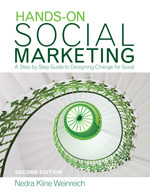
Well, they did it. The New York City Board of Health this afternoon voted to ban trans fats from all foods in restaurants throughout the city. Is this a good thing, or is it a case where coercion through policy is inappropriate? As a social marketer who wants people to become healthier, this would seem to be a no-brainer, yet I have mixed feelings about this development. This reminds me of Stephen Dann‘s comment on the Social Marketing listserv a while back, which Craig recounted on his blog:
Government driven social marketing can turn around and change the law to make our alternative behaviour mandatory. We can attempt to use social marketing to gain compliance to our idea, or we can force behaviour through punishment. Switching to legislative enforcement when our social change campaigns fail to take a grip is cheating. It’s saying that if you won’t play nicely, we’ll force you to play.
This would not have been possible without the efforts of the anti-smoking forces that paved the way for policy change back in the 90s. I do see a difference, though, between restricting secondhand smoke — which can affect the health of other people — and restricting the use of trans fats — which only affects the eater.
That’s not to say that getting restaurants to reduce or eliminate trans fats is not an important and worthy goal. But perhaps a social marketing campaign to restauranteurs, along with various incentives (e.g., tax breaks from the city for trans fat-free establishments) would have been a step to try before treating chefs like criminals.

 Nedra helps nonprofits and public agencies create positive change on health and social issues through social marketing and transmedia storytelling strategies at Weinreich Communications since founding the company in 1995. She helps organizations make a difference for the populations they serve by strategically designing programs that draw on state-of-the-art behavior change techniques, digital media approaches and the power of stories.
Nedra helps nonprofits and public agencies create positive change on health and social issues through social marketing and transmedia storytelling strategies at Weinreich Communications since founding the company in 1995. She helps organizations make a difference for the populations they serve by strategically designing programs that draw on state-of-the-art behavior change techniques, digital media approaches and the power of stories. 
Seems like an excellent opportunity for another food fad, doesn’t it?
“affects only the eater”…
that is, until it affects the rest of us through the costs of taking care of obese people and their multitudinous health problems. by your reasoning, why should anyone have to wear a seatbelt? yet i am happy for seatbelt laws, because now that fewer people are injured/killed due to not wearing a seatbelt, i pay less for their irresponsibility.
At some point this becomes an issue of personal freedom. I love my Krispy Kremes just the way they are and I’ll work out a little more to burn off the fat. I’m not sure I am causing any harm to society by consuming them. Not the same as second smoke. The same exact argument could be applied to alcohol which creates a huge social cost but we know that banning it is a dumb idea. Instead of banning alcohol, we tax it heavily and in theory the tax revenue covers the social costs (if not, raise the taxes but don’t ban the booze.) Why not tax trans fats too instead of banning them and use the money to cover the related social costs?
If someone smokes next to me, or drives dangerously near me, or juggles sharp knives next to me, I can see the risk and move away from the threat.
If a corporation embeds a substance that’s known to produce NO health benefits and to produce health risks, I can’t always tell.
This is especially true if the corporation, acting in concert with other like-minded corporation, lobbies to have the legal definition of the risk changed so that it can continue to embed the toxic substance while publicly stating that the substance isn’t defined as a risk.
It’s a wonderful, albeit overly simplistic, idea to limit “unnecessary government interference.” But when doing so we need to be sure we’re not simply providng a way for one or more politically influential corporations to gain more unregulated control over our lives than “big government” ever had or wanted.